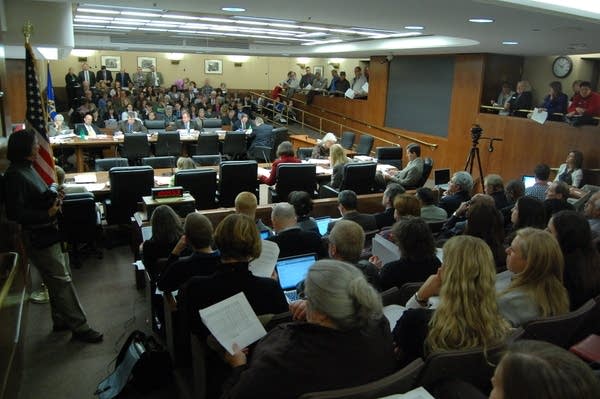Dayton objects to GOP education plan

Gov. Mark Dayton's education commissioner indicated Monday that a new schools funding proposal offered by House Republicans at the Capitol is unacceptable, and a likely veto target.
The proposal was released this weekend by Republican House leaders. It includes several changes to the way the state funds schools, and also includes several policy changes that have GOP support.
The 118-page bill leaves few aspects of state education funding and policy untouched.
Republicans want to spend about $200 million less on education than DFL Gov. Mark Dayton has proposed. More significantly, they'd dramatically alter how that money would be spent.
Create a More Connected Minnesota
MPR News is your trusted resource for the news you need. With your support, MPR News brings accessible, courageous journalism and authentic conversation to everyone - free of paywalls and barriers. Your gift makes a difference.
There are also several policy proposals included -- from changing teacher seniority rules and forbidding teacher strikes, to funding vouchers for low-income students to attend private schools.
"This may make some of the adults feel uncomfortable who feel more comfortable with the status quo, but that's all right," said State Rep. Pat Garafalo, R-Farmington, who chairs the House Education Finance Committee. "We're confident this is going to help kids, and that's the direction we're moving in."
More than 350 people crammed into a committee room Monday to hear the first testimony on Garofalo's bill.
That testimony began with the state's Education Commissioner Brenda Cassellius calling the bill "extreme" and "not serious," and hinting that Gov. Dayton would not sign it in its current form.
For one, Cassellius said the funding changes create winners and losers. Some districts would get increases in state funding, but at the expense of others -- mostly Minneapolis, St. Paul and Duluth.
"Unfairly targeting inner-city schools and those schools charged with educating students with the highest needs is unaccaptable," said Cassellius. "A redistribution in this nature would directly harm efforts to close achievement gaps, which I know we all want to do."
Cassellius also said funding changes would force local districts to seek higher property taxes.
In Minnesota, each school district starts with a basic level of $5,124 per pupil in state funding. That basic level would increase under the GOP plan, to $5,155 in fiscal year 2012, $5,210 in fiscal year 2013, and $5,375 in fiscal year 2014.
But the state's funding formula also includes dozens of add-ons, or categoricals, for various purposes, which is why total state funding varies by district.
Republicans are proposing several changes to those categoricals, including cutting aid for integration efforts -- a change which drew praise from some school officials who say the current system of integration aid is broken.
The St. Paul school district estimates the funding changes would mean a loss of $14 million for the upcoming fiscal year, on top of the district's current shortfall of $19 million.
Charlie Kyte, who lobbies on behalf of school superintendents, said he likes several policy changes Republicans proposed. But he was most worried by a cap on state special education funding.
School districts wouldn't be able to cut their own spending on special education because of federal and state requirements. So, they'd have to dip even more into their own general funds to offset the state cut.
"Many school districts are going to be sucking air, in terms of special ed," said Kyte. "None of the mandates are going away, but the funding is being capped, and that's going to be the biggest problem as we see it in this bill."
Rep. Garofalo said he plans to offer a bill later this session to ease state requirements on special education, which he says would save schools money.
The bill also includes several policy changes, including many related to teaching. Teachers wouldn't be able to go on strike, and could only negotiate new contracts during summer break.
The bill also includes a new statewide teacher evaluation system -- something that the statewide teachers union, Education Minnesota, says ignores local control for schools.
"We believe a local district and the teachers can develop a very good plan that fits the needs of their community, versus this bill which mandates how a teacher evaluation system should look like," said Jan Alswager, a lobbyist for Education Minnesota.
Testimony in the House was scheduled to continue Monday evening, while Republicans in the Senate also introduced their own education bill Monday afternoon. Three days of testimony are being planned this week on that version of the legislation.
